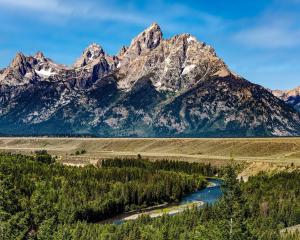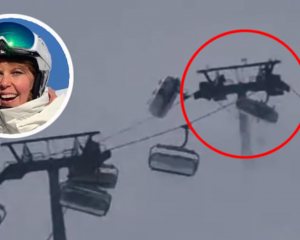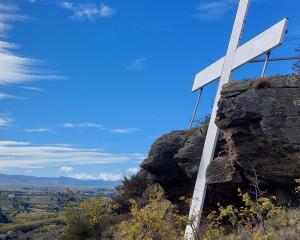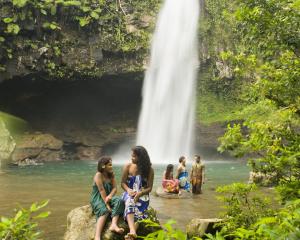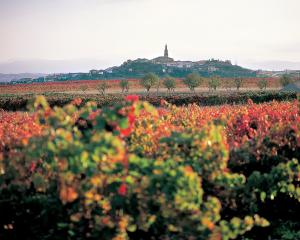The fuse will soon be lit for Easter celebrations in Greece, writes Diana Noonan.
An orange moon is hanging in a velvet sky when the first explosion of the evening occurs.
Echoes from the reverberating boom dance around the 300m-high cliffs that tower above the town, and are followed by a volley of less significant detonations.
In the living room of my friend's house, we cover our ears and hold our breath.
We wait for the big one and, sure enough, seconds later, an ear-splitting wall of noise and the possible rumble of a small rock slide has us sitting bolt upright in our chairs.
We raise our eyes to the ceiling in time to see a chunk of plaster fall to the floor followed by another, and another.
My friend shrugs. What can you do? It's Easter and this is Greece.
Outside, the town hall's loudspeakers (the only way of disseminating information in this virtually computerless village) crackle into life, spluttering a warning to whoever is up there in the hills that they had better keep the dynamite well away from the municipal water supply.
Just half an hour before this cacophony, I risked life and limb to weave my way through the winding narrow lanes from my house, sidestepping exploding home-made firecrackers raining down from every stone wall in the village.
Varalottas, as they're known here in the Peloponnese, bear no relation to the crackers we, as children, once threw on Guy Fawkes night.
These are weapons worth steering clear of, as evidenced by the number of men in the village missing digits.
A few years ago, on one of my annual Easter pilgrimages to this small town, festivities in the square ground to a halt when one unfortunate young man, his breast pocket stuffed with varalottas, fell from a wall and had half his chest blown out.
But nothing seems to stop the Easter revellers this year, even the law.
Rumour has it that two youths have been carted off to Tripoli where they are being held under antiterrorist legislation after the local police found them about to ignite their home-made fireworks under the foundations of the town hall.
For Orthodox Greece, Easter (where the enthusiasm among males can only be compared to the excitement of Kiwi duck-shooters on opening day) is the major festivity of the year.
Still, I mustn't complain about the pyrotechnics.
I spent this morning in relative calm, helping local women prepare floral wreaths for their church's processional float.
We spent hours tying on to toothpicks individual stock blossoms in Pascal colours, then poked them into coils of wrapped fresh lettuce leaves to create various ecclesiastical designs, all the while sustained with home-made Easter baking and a constant supply of thick, sweet coffee.
As the dynamiting in the hills subsides, I bid my friend good night and creep downstairs where aged Aunty Eleni (Greek homes seldom house just one generation) is experiencing a private battle of her own.
Her 12 enormous tsoreki (sweet Easter bread rings studded with red-dyed hard-boiled eggs) each the size of a large roasting dish, and laid out on her bed, are speckled with fragments of ceiling plaster. She throws up her hands in despair.
Just as home bakers in New Zealand swap hot cross buns, Greek women dart from house to house exchanging every sort of Easter baking you can imagine, from the tsoreki to kourabiethes (crescent-shaped almond shortbreads thickly coated in icing sugar) and koulourakia (butter-biscuits topped with sesame seeds).
''The shame!'' exclaims Aunty Eleni, of having nothing to give in return but plaster-festooned bread! She clucks her tongue and announces that she is ducking next door to borrow a bed sheet from her daughter-in-law to cover the baking.
By Thursday evening, excitement in the town is at fever pitch.
The floral floats (one from each church) have been assembled in the street, carried on the shoulders of pious men, and are wending their way towards the square.
Incense hangs heavy in the air, mingling with the sweet sent of citrus blossom.
The winding chants from the gathering of priests assembled on a makeshift stage vie with the raucous explosions of varalottas, and the mayor is issuing warnings from his loudhailer.
The service drones on into the evening until, all at once, the floats are on their way again, edging their way back through the crowds to their respective churches where they will remain until the midnight Saturday service.
Good Friday's tolling church bells are a solemn reminder that Easter is a time of contemplation.
With them comes a semi-ceasefire and, for a time, peace reigns in the village.
In the main street, half of Athens (the city empties out at Easter when every man and his dog returns to his own village) has gathered at the string of cafes, and octopus is slow-roasting over charcoal grills lining the edge of the road.
While meat and fish are off the lenten menu, octopus (on account of its apparently being bloodless) is the dish of the day.
Outside shops, small children tug on their grandmother's sleeves and point to lambathas, Easter candles adorned with sweets and toys.
The equivalent of Christmas stockings, they are given to children by their godparents on Easter Sunday.
But while most of the village is socialising, a few dedicated artisans are busy labouring in backyards and the sheds of retired donkeys, adding the finishing touches to dozens of colourful aerostata, the tissue hot-air balloons, each a metre high, that are the hallmark of the festivities in this part of the Peloponnese.
Throughout the town there is a sense of waiting.
Tomorrow is Saturday, and at midnight, ''boom!'', Easter will have arrived with a vengeance.
I am happier than most to wait for the real celebrations, and not just because of the noise.
Easter Sunday is a meaty feast, and while vegetarians like myself can dodge the traditional spit-roasted lamb and goat, the sight of kokoritisi (seasoned lamb's entrails bound with intestine) turning over beds of charcoal on Sunday morning, is less easy to ignore.
But at 11pm on Saturday, who can resist joining in the flow of villagers making their way through the narrow streets, past freshly whitewashed walls topped with flickering orange-skin lanterns?
The service has already begun when my friend and I arrive at the church and join the throng gathered outside.
The varalotta-lighters are out in force and the service, broadcast through a loudspeaker, is barely audible amid the booming of fireworks and the excited squeals of children.
Suddenly, a pile of dry orange prunings just a few metres from the church, bursts into flame.
There's a flurry of beating before it's extinguished and, by then, the priest is emerging from the church to announce ''Christos Annesti!'' Christ has risen!
The crowd surges forward, everyone eager to light their own domestic candle from the priest's.
''Christos Annesti'', we call to each other as high above, like jewels glittering in the star-studded sky, the first of the aerostata track a graceful path along the valley and out towards the tranquil ocean.
By 1am, more than a hundred aerostata have been successfully launched and only a handful have crash-landed in the hills close to homes or set alight an orchard.
Though I am still on New Zealand time and would like to head for bed, I trudge my weary way with my friend to her sister-in-law's lenten-breaking family feast where, although I am excused the sharing of mayititsa, the offal soup that traditionally breaks the fast, its aroma is enough to put me off eating anything else.
As we toast with glasses of retsina, relative calm settles outside.
For the amateur pyrotechnicians, food has, for a time, taken precedence.
Tomorrow, the feasting will begin all over again. From the public picnic in the square, sponsored by the mayor, to the dancing and handing out of hundreds of deiplas (deep-fried honey and cinnamon-glazed pastries), Easter will have been well and truly welcomed in.
And as if things couldn't get any better, just as my friend and I are about to leave the midnight party, news arrives that the fireworks terrorists carted off to Tripoli have been released in time to join their families for Sunday dinner.
In a Greek village, Easter doesn't get any better than this!
• Diana Noonan is a South Otago-based writer.
If you go
When to go: Easter in Orthodox Greece usually (but not always) arrives a few days to a few weeks later than our own celebrations. Check on the internet for dates before making bookings.
Where to go: Easter is the most important celebration in the Greek calendar. While feasting, elaborate church services, and traditional dancing in national dress can be seen everywhere in the country. Leonidion in the southeast of the Peloponnesus offers the most spectacular festivities, and many opportunities to join in with public celebrations.
How to get there: If arriving in Athens, trains for Korinthos leave directly from the airport (a journey of about one and a-half hours). From Korinthos hire a car (ask for it to be delivered to the train station) or catch a local bus to Leonidion (about a three-hour journey). Check timetables as public transport services vary at holiday times.




